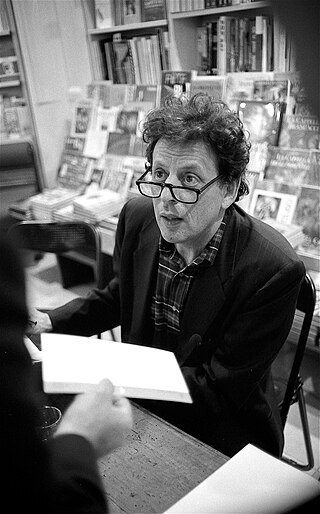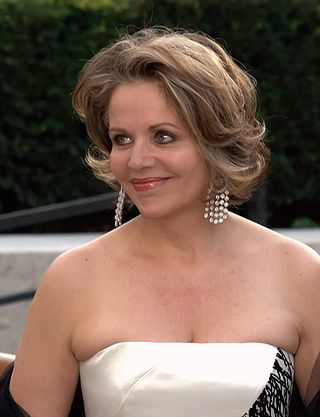Related Research Articles

Philip Glass is an American composer and pianist. He is widely regarded as one of the most influential composers of the late 20th century. Glass's work has been associated with minimalism, being built up from repetitive phrases and shifting layers. Glass describes himself as a composer of "music with repetitive structures", which he has helped to evolve stylistically.
"Plutonian Ode" is a poem written by American Beat poet Allen Ginsberg in 1978 against the arms race and nuclear armament of the superpowers. It is heavily inspired by Gnosticism which Ginsberg came to know after reading Hans Jonas's book on the subject.
Symphony No. 6 may refer to:

Lorin Varencove Maazel was an American conductor, violinist and composer. He began conducting at the age of eight and by 1953 had decided to pursue a career in music. He had established a reputation in the concert halls of Europe by 1960 but, by comparison, his career in the U.S. progressed far more slowly. He served as music director of The Cleveland Orchestra, Orchestre National de France, Pittsburgh Symphony Orchestra, Bavarian Radio Symphony Orchestra, and the New York Philharmonic, among other posts. Maazel was well-regarded in baton technique and possessed a photographic memory for scores. Described as mercurial and forbidding in rehearsal, he mellowed in old age.

Robert Eugene Ward was an American composer who is best remembered for his opera The Crucible (1961) after the 1953 play of the same name by Arthur Miller. He was awarded the Pulitzer Prize for Music for that opera in 1962.

Stuart Oliver Knussen was a British composer and conductor.

Michael Tilson Thomas is an American conductor, pianist and composer. He is Artistic Director Laureate of the New World Symphony, an American orchestral academy based in Miami Beach, Florida, Music Director Laureate of the San Francisco Symphony, and Conductor Laureate of the London Symphony Orchestra.

Ode for the Birthday of Queen Anne is a secular cantata composed by George Frideric Handel to a libretto by Ambrose Philips, of which the first line, "Eternal source of light divine", provides an alternative title for the work. It was probably composed during January 1713 for a performance on 6 February 1713, although there is no record of the performance having actually taken place. Other catalogues of Handel's music have referred to the work as HG xlvi A; and HHA i/6.

Dennis Russell Davies is an American conductor and pianist. After his tenure at Bruckner Orchestra Linz, he is the music director and chief conductor of the Brno Philharmonic.

Le temps l'horloge is a song cycle for soprano and orchestra, by the French composer Henri Dutilleux.
Mark Grey is an American classical music composer, sound designer and sound engineer.

A choral symphony is a musical composition for orchestra, choir, and sometimes solo vocalists that, in its internal workings and overall musical architecture, adheres broadly to symphonic musical form. The term "choral symphony" in this context was coined by Hector Berlioz when he described his Roméo et Juliette as such in his five-paragraph introduction to that work. The direct antecedent for the choral symphony is Ludwig van Beethoven's Ninth Symphony. Beethoven's Ninth incorporates part of the Ode an die Freude, a poem by Friedrich Schiller, with text sung by soloists and chorus in the last movement. It is the first example of a major composer's use of the human voice on the same level as instruments in a symphony.
The Choral Symphony is a work by Gustav Holst for soprano soloist, chorus, and orchestra in a setting of verses by John Keats. Written in 1923–24, it was premiered in Leeds Town Hall on October 7, 1925, conducted by Albert Coates with Dorothy Silk as soloist. The same performers gave the work's second performance three weeks later in Queen's Hall, London. The work is sometimes known as the First Choral Symphony, although a planned 'second Choral Symphony' never progressed beyond some uncompleted sketches.

Alexander Borisovich Zhurbin, born in Tashkent, Uzbekistan on 7 August 1945, is a Russian composer.
Lauren Flanigan is an American operatic soprano who has had an active international career since the 1980s. She enjoyed a particularly fruitful partnership with the New York City Opera, appearing with the company almost every year since 1990. She has sung more than 100 different opera roles on stage during her career, often appearing in contemporary works or more rarely staged operas. Opera News stated that, "Flanigan has enjoyed one of the most distinctive careers of any artist of her generation, one marked by a high volume of contemporary works. Modern composers love her because of her innate musicality, dramatic power and lightning-fast skills and instincts."

Mohammed Fairouz is an American composer.
The following is a list of musical works which received their premieres at Carnegie Hall:
Symphony No. 9 is Philip Glass's ninth symphony. It was written between 2010 and 2011. It is written in 3 movements. The work was jointly commissioned by the Bruckner Orchester Linz, Carnegie Hall, and the Los Angeles Philharmonic Association.
Symphony No. 11 is the eleventh symphony by the American composer Philip Glass. The work was commissioned by the Bruckner Orchestra Linz, Istanbul International Music Festival, and the Queensland Symphony Orchestra and premiered January 31, 2017, Glass's 80th birthday, with Dennis Russell Davies conducting the Bruckner Orchestra Linz at Carnegie Hall in New York City.
References
- ↑ Allan Kozinn (February 6, 2002). "MUSIC REVIEW; Happy, Happy, Happy Birthday". The New York Times .